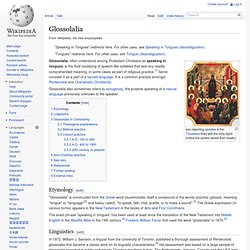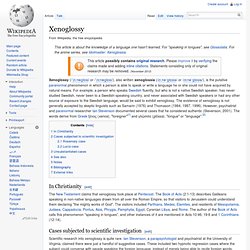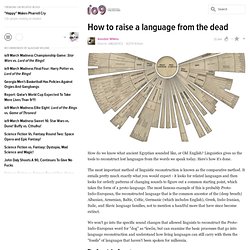

Angelic tongues. Angelic tongues are the languages supposedly used by angels.

It usually refers to sung praise in Second Temple period Jewish materials. Hebrew Bible[edit] Throughout the Old Testament there is no indication that angels spoke (on earth) any other language than that of men. Nor any indication of heavenly tongues: Psa 148:2 "Praise ye him, all his angels: praise ye him, all his hosts.
" Dead Sea Scrolls[edit] Songs of the Sabbath Sacrifice is the principal source for angelic tongues at Qumran. . [...] through the wonderful height [...] tongue of purity [...] gods (~yhla), seven [...] 4Q400 3 1, 1-2...Psalm of praise, on the tongue of the fou[rth]... It is not clear whether the angelic tongues are coherent, intelligible to man. Testament of Job[edit] "And she took on another heart—no longer minded toward earthly things—but ecstatically in the angelic dialect, sending up a hymn to God in accord with the style of the angels.
New Testament[edit] References[edit] Glossolalia. Icon depicting apostles & the Theotokos filled with the Holy Spirit (notice fire symbol above their heads.)

Glossolalia, often understood among Protestant Christians as speaking in tongues, is the fluid vocalizing of speech-like syllables that lack any readily comprehended meaning, in some cases as part of religious practice.[1] Some consider it as a part of a sacred language. It is a common practice amongst Pentecostal and Charismatic Christianity. Glossolalia also sometimes refers to xenoglossy, the putative speaking of a natural language previously unknown to the speaker. Etymology[edit] "Glossolalia" is constructed from the Greek word γλωσσολαλία, itself a compound of the words γλῶσσα (glossa), meaning "tongue" or "language"[2] and λαλέω (laleō), "to speak, talk, chat, prattle, or to make a sound".[3] The Greek expression (in various forms) appears in the New Testament in the books of Acts and First Corinthians.
Xenoglossy. Xenoglossy (/ˈziːnɵɡlɒsi/ or /ˈzɛnɵɡlɒsi/), also written xenoglossia (/ziːnɵˈɡlɒsiə/ or /zɛnɵˈɡlɒsiə/), is the putative paranormal phenomenon in which a person is able to speak or write a language he or she could not have acquired by natural means.

For example, a person who speaks Swedish fluently, but who is not a native Swedish speaker, has never studied Swedish, never been to a Swedish-speaking country, and never associated with Swedish speakers or had any other source of exposure to the Swedish language, would be said to exhibit xenoglossy. The existence of xenoglossy is not generally accepted by skeptic linguists such as Samarin (1976) and Thomason (1984, 1987, 1996).
However, psychiatrist and paranormal researcher Ian Stevenson documented several cases that he considered authentic (Stevenson, 2001). The words derive from Greek ξένος (xenos), "foreigner"[1] and γλῶσσα (glōssa), "tongue" or "language".[2] Why does linguistic information mean what it does? Sabrina has been working on a series of posts on an ecological analysis of language (here, here and here, plus more on the way).

Her focus has been on the nature of the information for language, and the similarities and differences this information has with the information for perception. We're working some of this analysis into a paper, and writing that got me thinking about this in a little more detail.Our main move on language is to reject the assumption that language is a qualitatively different kind of task than perception & action. The goal is to find ways to talk about these behaviours using the same basic analysis tools. Part of that is to draw the analogy to how perceptual information gets its meaning and use that to describe how linguistic information gets its meaning.
What I want to do here is just map this analogy out a little, because I ended up in an interesting place and I want feedback from people who know more than us on this about whether this is just plain crazy. How to raise a language from the dead. Chaucer wrote the Canterbury Tales in Middle English, not Old English.

Iif it had been written in Old English, it would be almost unreadable to the average student: HWÆT, WE GAR-DEna in geardagum, þeodcyninga þrym gefrunon, hu ða æþelingas ellen fremedon! Oft Scyld Scefing sceaþena þreatum,